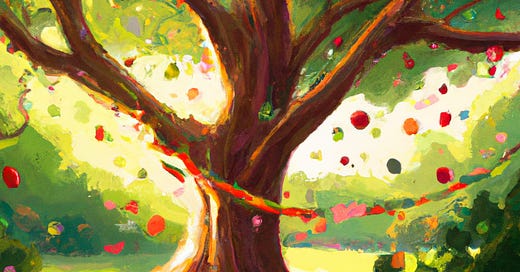When I resonate with something, I have an unquenchable desire to read, listen, and share it. Such was my feeling when I first read Charles Eisenstein’s book, Sacred Economics.
Although he holds a degree in Mathematics and Philosophy, Eisenstein took a different path than many would with a degree from Yale. He became a Chinese translator, worked in academia, and then quit, entering a period of searching and study. Blending spiritual wisdom with scientific knowledge on economics and climate, he writes books that describe the problems plaguing society and explores how we can create a more beautiful world.
A conversation with my former boss, now a friend and mentor, guided me to Charles Eisenstein’s work. Discussing abundance, she spoke about the gifts that we can offer to each other. She cited some inspiration from a book, “Sacred Economics.” The title alone was enigmatic, and a flickering curiosity had erupted into a restless desire to read.
From the first page, I couldn’t stop. The book is a tour of history, an inspiring philosophy, and a plea for humanity to evolve our economic system into one that is more aligned with our inherent generosity.
Today, we dive into Charles Eisenstein's writing around the nature of gift. The quotes in this essay, unless noted otherwise, are from Sacred Economics.
Mysterious Interconnections
Why are we so attached to certain physical artifacts, even if they’ve ceased to function, even if they’ve become tattered and torn in the winds of time?
“You probably have some treasured items that were given to you, that are perhaps objectively indistinguishable from something you might buy, but that are unique and special because of who gave them to you. Thus it was that ancient people recognized that a magical quality, a spirit, circulates along with gifts.”
That magical spirit is buried within our modern-world psyches. When we give or receive a gift, we realize how interconnected we are.
The feeling of interconnection is perhaps more obvious for gifts that aren’t physical presents, wrapped and tied, tucked under trees. A gift is an "I love you" or a smile on the sidewalk.
“Another way of looking at it is that the gift partakes of the giver, and that when we give a gift, we give something of ourselves. This is opposite of a modern commodity transaction, in which goods sold are mere property, separate from the one who sells them.”
It’s Natural
We entered this world laden with gifts. The motions of our bodies, the endless ponderings of our minds, the blossoming gardens upon loamy soil, and the sun that bathes us in light – they are all gifts.
“Gratitude is therefore natural to us, so primal, so elemental that it is very difficult to define. Perhaps it is the feeling of having received a gift, and the desire to give in turn.”
The desire to be generous seems to be at odds with our competitive, hustling, hoarding, and saving focused economy. We have a belief that modern money flows mirror the natural order of the world. After all, isn't nature rife with cutthroat Darwinian competition? Eisenstein doesn’t think so.
“Just as science often projects culture onto nature, so economics takes culturally determined conditions as axiomatic. Living in a culture of scarcity, we assume it as the basis of economics.”
Mature ecosystems work in symbiosis, not in competition that kills off other species, and we’re just starting to realize that.
“In nature, headlong growth and all-out competition are features of immature ecosystems, followed by complex interdependency, symbiosis, cooperation, and the cycling of resources. The next stage of human economy will parallel what we are beginning to understand about nature.”
Eisenstein believes that we’ll embrace a gift economy… once again.
Gift Economics
In the ancient morning of our human age, the world was a place where gifting was abundant. Our transaction-infested economic system is a relatively recent phenomenon.
“Money was inhabited, as it were, by two spirits from the very beginning. It was both an extension of gift economics (which was once nearly all there was) into the realm of mass society and an incursion of measuring, counting, keeping, and controlling into the original openness of gift mentality.“
By “gift economics” Eisenstein means that “exchange” in communities was done by gifting to each other. These gifts could be anything that we have at our disposal, including our skills and services.
As he says in this video: “In my ideal world, work becomes a matter of the expression of our gifts, motivated by passion, called forth by the needs, and not coerced by money.”
In a gift economy, neighbors would lend each other grocery items. Now we have our groceries delivered and we pay for the service with money. We don’t see where our food was grown or who it was grown by – we don’t even pick our food, and it arrives anonymously and unceremoniously on our doorsteps. Whoever does the work to grow, distribute, and deliver the groceries get money as a form of payment, but not much in the form of gratitude.
This way, “economic growth” effectively means taking something that we would have exchanged with others for free, and monetizing it.
The argument that it's unnatural for us to monetize all that we touch might seem far fetched. Yet, through the mysteries of language, we know that this idea of separation – of mine versus yours – wasn’t always our modus operandi.
“While today we clearly distinguish between a gift and a commercial transaction, in past times this distinction was by no means clear… This ambiguity persists in many modern languages. Chinese, German, Danish, Norwegian, Dutch, Estonian, Bulgarian, Serbian, Japanese, and many others each have but a single term for borrowing and lending, perhaps a vestige of an ancient time when the two were not distinguished.”
Where Now?
It’s one thing to understand gift economics, and it’s another to embody it. I certainly don’t know the way to live life fully in gift, and my thoughts on these economic theories are ever-evolving as I read, travel, and write more. But I’m thinking. Can we earn and consume abundantly by embracing generosity?
Eisenstein says that human society will mature into a beautiful one. I agree with his optimism. Every time someone carpools, shares tools, upcycles, cat-sits, hosts dinner, and hugs, we lean further into gift.
As a human race, we’re realizing that we can’t simply convert every earthly resource into a good, dispassionately sold, in order to make a ticker symbol jump.
What magic will emerge from our collective consciousness?
What gifts will we give each other?
If this essay sparked your curiosity, know that this is just scratching the surface of the ideas that Eisenstein explores.
Firstly, subscribe to his Substack:
If you’re interested in the general thesis of Eisenstein’s work, he recommends starting with The More Beautiful World Our Hearts Know Is Possible.
If you’re specifically curious about economics, Eisenstein has offered his book, Sacred Economics, as a gift on his website – where you can read it for free. I highly recommend the paper copy of the revised edition, however, which includes post-covid updates.
Prefer a video? This 12 minute recap covers some of the basics of Sacred Economics:





